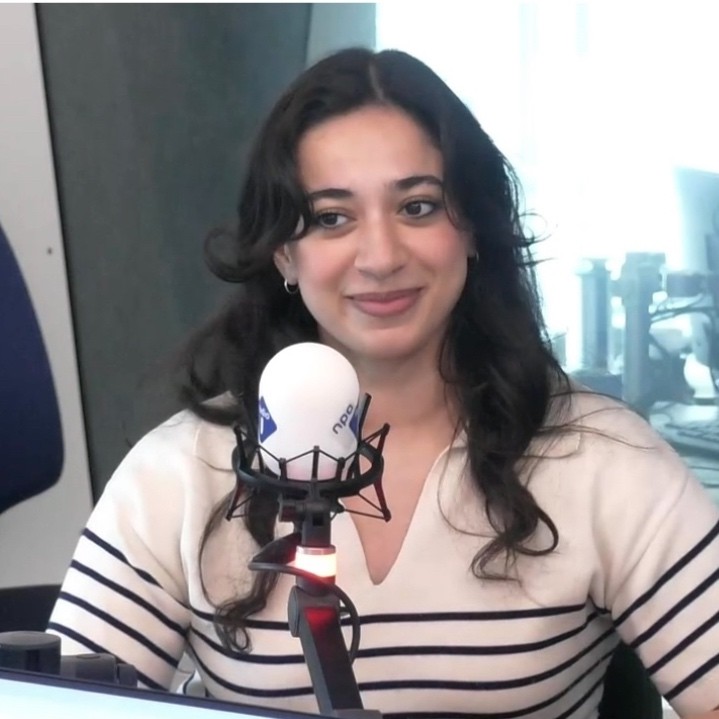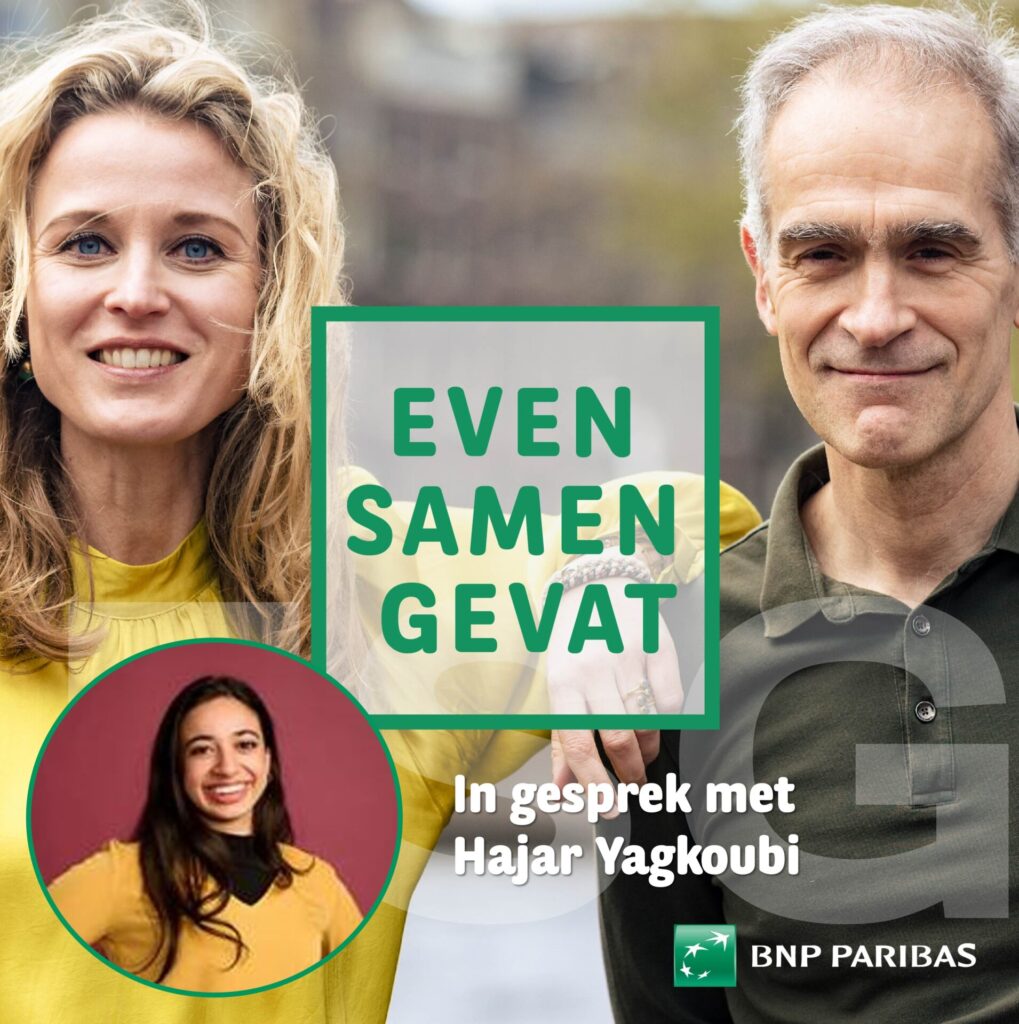Generation Z and the climate: on the shoulders of past generations
Episode 38 of ESG (Even Samen Gevat) is all about Generation Z, which Marloes and Aldert discuss with Hajar Yagkoubi. A real fireball, Hajar is brimming with enthusiasm about the social role that she and her peers are willing and able to play.
Who is Hajar Yagkoubi?
‘I recently turned 24, which makes me a bona fide Generation Z-er’, says Hajar Yagkoubi, a true Generation Z-er because she was born between 1995 and 2010. Hajar studied International Business in Tilburg and is one of the initiators of Network 2100, an intergenerational network of non-executive directors and up-and-coming talents. In addition, she is part of Schiphol’s Advisory Council on Sustainability, she’s a member of the Social Impact Team (Covid measures) and for two years she was the UN Youth Representative for the Netherlands on human rights and safety. She was also a speaker at COP28 in Dubai.
Everything that Hajar does revolves around the younger person’s perspective: ‘If you’re young, you have a long future, which means you see things much more from a long-term perspective. That’s basically what I want to do. I want to make sure that decisions taken in politics or by companies include much more of a long-term perspective.’ So, she and her colleagues in Network 2100 advocate better representation of young people in management circles. ‘Just think about it: the average age of a non-executive director is 68.’
What got her here?
It all started in 2016 with a story about a friend of Hajar’s who had lived in various foster homes. ‘She told me that hardly anyone listened to the needs of young people in the youth care system.’ Hajar asked herself: ‘How can it be that nobody talks to these young people?’ So she and a couple of friends went to pay the youths a visit and then met with the local authority. ‘This was my first personal, tangible initiative that showed what kinds of great things you can achieve if you bring people together.’ Ultimately it turned out that while there actually was a lot of goodwill towards them, nobody had really thought to talk to the young people directly. That went against Hajar’s sense of justice.
Then there’s the climate issue. That really got through to Hajar when she spoke to a 19-year-old woman from Kiribati while at UN headquarters. Kiribati is an island country in the Pacific Ocean that – with today’s global warming and rising sea level – will become completely submerged in 50 years’ time. ‘That was a turning point for me. It was the first time that I thought: this crisis is about people and about a dignified existence.
How do young people see the world?
Hajar talks about a major survey by a university in the UK on how young people from Generation Z experience the climate crisis. The question was: in which countries are young people the most worried about the climate? You might think: young people in the West. But in first place came the Philippines, with Brazil second and India third. Why? ‘Those are countries with a lot more poverty and inequality and where people are already seeing what the effects are.’
At the same time, you see that young people from Generation Z worldwide are suffering from all the crises of our times. There are even new words for that: ‘eco-anxiety’ and ‘climate depression’. But the growing stress and burnouts among young people are not caused by the climate alone. Generation Z was born during the rise of the internet. ‘We constantly receive information about everything that happens on this planet’, says Hajar. ‘On the one hand, this has made us very empathetic, and country borders have become less important. On the other, we’re constantly aware of all the crises around the world.’ Hajar describes four stages that people go through in these kinds of situations, which she illustrates with the Covid crisis. In the first stage, people are afraid. Stage 2 is the ‘honeymoon phase’: there is cohesion as people realise they’re all in the crisis together. Like the people who clapped their hands for all the healthcare workers during the Covid crisis. Stage 3 is ‘disillusionment’: people have a really hard time of it mentally (‘I want my freedom back!’) and feel lots of stress. And finally stage 4: ‘rebuilding’: you emerge from the crisis and rebuild your confidence. ‘The problem for young people is that they often don’t reach that final rebuilding stage because they already have their mind on the next crisis or because something new has happened.’

Boardrooms are where we really need to work together: baby boomers, Generation X and today’s young people. The millennials had already done a good job at creating lots of awareness about the climate. We’re standing on the shoulders of those who came before us.
Is it all going to be just fine?
Hajar once spoke with an older colleague from Network 2100 over the crises that he’d lived through. He mentioned Chernobyl, the fall of the Berlin Wall, the hole in the ozone layer, the millennium bug, the financial crisis. And what do you think? ‘All those crises basically turned out fine.’ There was no nuclear apocalypse after Chernobyl, the Cold War came to an end, the hole in the ozone layer has more or less closed up, no aeroplanes fell out of the sky at the turn of the century and the financial world is going full tilt again.
But according to Hajar, climate change could be an exception, with far-reaching consequences. That’s why we need to take action now. ‘We sometimes forget the scale of the problem’, she says. ‘We must be very careful not to get too anecdotal about the past and revert to a kind of false optimism and think that everything is going to be just fine.’ Hope-washing, that’s what a good friend of Hajar’s calls it: heads of state and CEOs who assume that the ‘young generation’ will somehow solve everything. ‘It’s kind of a cop-out. A smoke screen. You don’t want to stay ‘hopeful’ and create the illusion that it’s all going to turn out just fine. At the same time, you don’t want to get stuck in a doom scenario.’
So what’s the solution?
‘One of my messages during COP 28 is that social value needs to be given a place in our economic system. That the long-term perspective needs to be made more structural in organisations’, says Hajar. And that means that you need to involve young people more in discussions and decision-making. Young people bring what she calls ‘the transformative perspective’. ‘A boardroom that becomes more diverse will make better decisions and achieve better results. Diversity is one of the ways you can eliminate blind spots in your organisation.’
That does not mean that everything is about young people only. Hajar emphasises that Network 2100 is an intergenerational network and that it’s not just 100% young people. ‘Boardrooms are where we really need to work together: baby boomers, Generation X and today’s young people. The millennials had already done a good job at creating lots of awareness about the climate. We’re standing on the shoulders of those who came before us.’ Generation Z wants to keep building on the activism of those predecessors and focus a lot more on specific action. And on transparency. That’s what really matters to Generation Z: openness about things. That transparency is something Hajar also finds lacking in today’s politics, which she says partially explains the outcome of the recent elections for the Dutch Lower House of Parliament.
Sense of community, solidarity and empathy: those things mean a lot to Hajar. Many young people are sensitive to that in these days when people live in their own bubble. ‘We need to understand each other better. We’re heading for some very turbulent times, and we need to hold on to each other.’
ESG Even Samen Gevat is a podcast series (in Dutch) in which Aldert Veldhuisen and Marloes Bergevoet talk to accelerators of the sustainable transition. They discuss topics related to the “E”, like green energy, CO2 emissions, raw materials, biodiversity, the “S” of health, diversity and inclusiveness and the “G” such as laws and regulations and international cooperation.
Also published in this series are:
- Long-haul flights will not be truly sustainable for the next 20 years either – with Richard Emmerink
- Seen, heard and respected – with Marcia Goddard
- Champion of sustainability in the health care sector – with Wouter Hehenkamp
Follow Even Samen Gevat here so you don’t miss an episode!
